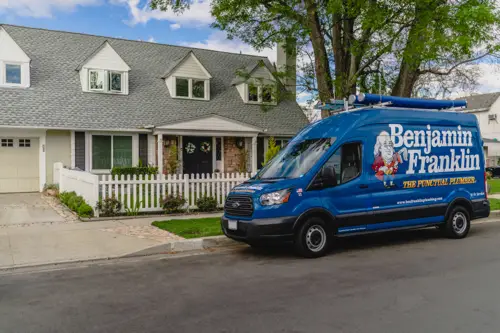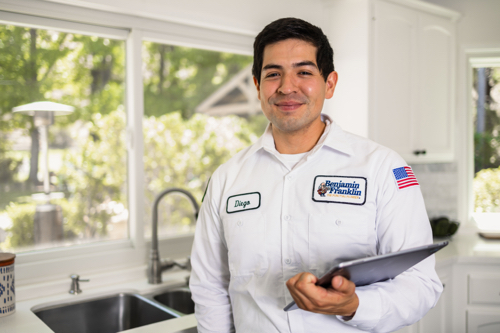Say Goodbye to Cold Showers: The Ultimate Guide to Tankless Water  Heaters
Heaters
Let me paint you a picture. It’s early morning, you’re half-asleep, looking forward to that perfect, steamy shower that’ll wake you up and prepare you for the day. Then suddenly WHAM! an ice-cold blast of water hits you, shattering your peaceful morning routine. Sound familiar?
If you’re nodding right now, buckle up. I’m about to introduce you to the home technology that might just save your mornings (and your sanity): tankless water heaters.
The Cold, Hard Truth About Traditional Water Heating
Before we dive into tankless technology, let’s talk about traditional water heaters. You know, those massive, hulking tanks that squat in your utility room or basement, constantly working to keep gallons of water hot—even when you’re not using them. It’s like keeping a pot of water boiling all day long, just in case you might want some tea later. Inefficient? Absolutely.
What Makes Tankless Water Heaters Different?
Think of a tankless water heater as the smart, efficient cousin of those old-school water tanks. Instead of storing and continuously reheating water, these modern marvels heat water exactly when you need it. It’s like having a barista who prepares your coffee the moment you order, instead of brewing a giant pot that sits around getting stale.
How They Work: A Behind-the-Scenes Tour
Here’s the fascinating process that happens in mere seconds:
- Water Enters the System: When you turn on a hot water tap, cold water travels through a pipe into the tankless unit.
- Instant Heating Magic: Electric elements or gas burners immediately spring to life, rapidly heating the water.
- On-Demand Delivery: The now-hot water streams directly to your faucet or appliance.
- Energy-Saving Shutdown: The moment you turn off the tap, the heating stops. No wasted energy, no constant reheating.
Two Paths to Hot Water: Electric vs. Gas Tankless Heaters
You’ve got two main options in the tankless world, each with its own personality:
Electric Tankless Water Heaters
Perfect for smaller spaces like apartments or homes with lower hot water demands. They’re compact, relatively simple to install, and don’t require complex venting. Think of them as the nimble, urban-dwelling cousin in the water heating family.
Gas Tankless Water Heaters
These powerhouses use natural gas or propane and pack a serious punch. They’re ideal for larger households with multiple bathrooms or high hot water consumption. The trade-off? They typically require professional installation and might need upgrades to your home’s gas lines.
The Compelling Benefits: Why You Might Want to Go Tankless
Let’s talk about why these systems are more than just a trendy home improvement:
Endless Hot Water, Zero Anxiety
Remember those mornings fighting for hot water? Tankless heaters ensure everyone gets a warm shower, whether you’re last in line or first. No more scheduling shower times like a military operation or rushing to beat your family members to the bathroom.
Real Energy Savings
According to the U.S. Department of Energy, households can slash their water heating energy costs by up to 34% if they’re using less than 41 gallons daily. That’s not just saving—that’s potentially funding your next vacation or a fancy dinner out.
Space-Saving Design
Say goodbye to that monstrous water tank consuming valuable utility room space. Tankless units are the minimalists of home appliances—compact, sleek, and easily wall-mountable. They’re essentially the Marie Kondo of water heating.
Impressive Longevity
While traditional water heaters might wave the white flag after 10-12 years, tankless models can keep performing for around 20 years with proper maintenance. It’s like investing in a reliable, long-term relationship with your home’s hot water system.
Reduced Leak Risks
Without a massive tank of water just waiting to cause potential disaster, you’re significantly minimizing the risk of water damage. Your floors, walls, and peace of mind will appreciate this feature.
Potential Challenges: The Fine Print
Now, I’m not suggesting tankless water heaters are a magical solution for everyone. Some considerations:
- Initial Investment: These systems cost more upfront. Think of it as paying now for long-term savings and comfort.
- Flow Rate Limitations: If your entire household wants hot water simultaneously, you might need multiple units or a high-capacity system.
- Professional Installation: This isn’t a weekend DIY project. You’ll want certified professionals handling the setup.
Maintenance: Keeping Your Tankless Buddy Happy
Like any sophisticated piece of technology, your tankless water heater needs some regular TLC:
- Descale to prevent mineral buildup
- Periodically flush the system
- For gas models, check venting regularly
- Replace filters as the manufacturer recommends
- Monitor overall performance
The Million-Dollar Question: Is a Tankless Water Heater Right for You?
The answer isn’t one-size-fits-all. Small families or energy-conscious households often see immediate benefits. Larger families might need strategic planning with multiple units or a more robust model.
My advice? Consult a professional who can analyze your specific hot water needs. They’re essentially matchmakers for your home’s comfort and efficiency.
Your Comfort, Reimagined
Tankless water heaters represent more than just a technological upgrade. They’re a lifestyle improvement—offering energy efficiency, space savings, and the luxury of on-demand hot water.
Ready to transform your home’s hot water experience? Reach out to a certified plumber, explore your options, and say hello to endless warm showers and lower energy bills.
